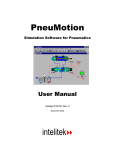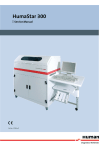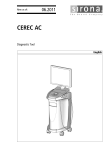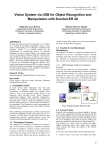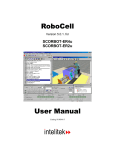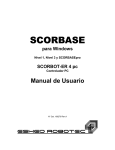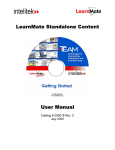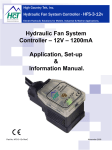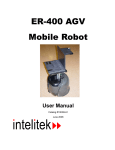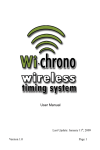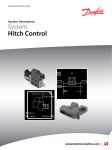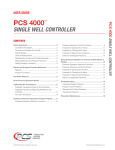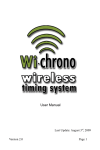Download 100201-c HydraMotion(0212)
Transcript
HydraMotion Simulation Software for Hydraulics User Manual Catalog #100201 Rev. C December 2002 Copyright ©2002 Intelitek Inc. HydraMotion User Manual Catalog No. 100201 Rev. C December 2002 Every effort has been made to make this book as complete and accurate as possible. However, no warranty of suitability, purpose, or fitness is made or implied. Intelitek is not liable or responsible to any person or entity for loss or damage in connection with or stemming from the use of the software, equipment and/or the information contained in this publication. Intelitek bears no responsibility for errors which may appear in this publication and retains the right to change specifications without prior notice. Intelitek Inc. 444 East Industrial Park Drive Manchester, NH 03109-5317 USA Tel: (603) 625-8600 Fax: (603) 625-2137 website: http://www.intelitek.com email: [email protected] Table of Contents Chapter 1: Introduction.............................................................................7 Chapter 2: Installation and Activation .....................................................9 System Requirements ............................................................................................................. 9 Installing the Software .......................................................................................................... 10 Uninstalling the Software. .................................................................................................... 12 Activating the Software ........................................................................................................ 13 Quitting the Software............................................................................................................ 13 Chapter 3: Overview................................................................................15 The HydraMotion Window................................................................................................... 15 File Menu .............................................................................................................................. 16 Edit Menu ............................................................................................................................. 17 View Menu ........................................................................................................................... 18 Components Menu................................................................................................................ 18 Connections Menu ................................................................................................................ 19 Simulation Menu................................................................................................................... 19 Interface Menu ...................................................................................................................... 20 Window Menu ...................................................................................................................... 20 Help Menu ............................................................................................................................ 21 Chapter 4: Components ..........................................................................23 Selecting Components .......................................................................................................... 23 Manipulating Components.................................................................................................... 26 Component Parameters ......................................................................................................... 29 Chapter 5: Connections ..........................................................................31 Connecting Components....................................................................................................... 31 Linking Push Buttons............................................................................................................ 34 Ladder Diagrams................................................................................................................... 36 Chapter 6: Views .....................................................................................39 Cross Section Display........................................................................................................... 39 Schematic Display ................................................................................................................ 40 Zoom ..................................................................................................................................... 40 Parameter Diagram ............................................................................................................... 42 Ladder Diagram Display....................................................................................................... 43 User Manual 0212 5 HydraMotion Simulation Software for Hydraulics Chapter 7: Simulation .............................................................................45 Single Component Simulation .............................................................................................. 45 Circuit Simulation................................................................................................................. 46 Chapter 8: File Management...................................................................47 Chapter 9: System Setup ........................................................................49 Program Windows ................................................................................................................ 49 On-Line Operation ................................................................................................................ 50 Chapter 10:Software Licensing ..............................................................53 Registering the Software from Intelitek’s Website............................................................... 53 Registering the Software from the License Diskette ............................................................ 59 User Manual 0212 6 HydraMotion Simulation Software for Hydraulics 1 Introduction HydraMotion is a simulation software package that provides an accurate working simulation of hydraulic devices and circuits. It enables students to study and understand the principles of hydraulics. As a design tool, HydraMotion allows students to create, operate and observe a model circuit. The circuit can be printed, altered and improved as needed. HydraMotion contains the features of its DOS- based predecessor, but many elements have been redesigned to suit and utilize Windows capabilities. HydraMotion can be used in conjunction with the HydraFlex work panel, on which an actual circuit with working components can be assembled and operated. User Manual 0212 7 HydraMotion Introduction User Manual 0212 8 HydraMotion Introduction 2 Installation and Activation System Requirements HydraMotion requires the following: • Computer: IBM-compatible PC with 80486 33 MHz processor, or higher. • At least 8 MB of RAM. • A hard drive with at least 10 MB of free disk space. • Windows 95, Windows98 or Windows NT. • A VGA or better graphics display. • A Mouse or other pointing device. User Manual 0212 9 HydraMotion Installation and Activation Installing the Software HydraMotion software is supplied on a CD-ROM together with a license diskette. The software is copy-protected, and you must put the license diskette into the computer floppy drive in order to install the software. A backup copy of the license diskette cannot be used. Therefore, be sure to keep the original license diskette in a safe place. To install the software, do the following: 1. Start Windows. 2. Close any open applications before you begin the installation. If you are about to reinstall the software or install a newer version to an existing HydraMotion directory, it is recommended that you backup any existing user-created files before you begin the installation. It is also recommended that you remove the previous HydraMotion installation by means of the Uninstall utility included with the software. 3. Insert the license diskette into the Computer floppy disk drive. Make sure the disk is not write-protected. 4. Insert the CD into the CD-ROM drive. The installation should begin automatically. If it does not, run setup.exe from the CD-ROM \Install folder. 5. Follow the instructions that appear on the screen. Installing HydraMotion on a PC without a CD Drive If you want to install the HydraMotion software on a PC that does not have a CD drive, do the following: Access a PC with a CD drive that is networked with the target PC, and follow the Installation instruction in the previous section. OR Use a PC that has both a CD drive and a floppy drive. User Manual 0212 • Copy all files in the HydraMotion CD's Install folder onto diskettes. • Each file named datan.cab (where n is a number; i.e., data1, data2) will fill one diskette. • All other files can be copied together onto a single diskette. • Copy all files from all the diskettes into a temporary folder on the target PC. • From the temporary folder, run setup.exe. • Follow the instructions that appear on the screen. 10 HydraMotion Installation and Activation You can delete the temporary directory after the installation, or you may keep it for reinstalling the software. During the software installation, messages and a percentage bar will be displayed on the screen to reflect the status of the installation procedure. You will be prompted to choose a language to install. Select a language from the following dialog box. By default, the software is installed to the folder HydraMotion. During the installation process you have the option to change this. It is not recommended that you do so. When the installation is complete, the HydraMotion program group will appear. To preserve the display of the HydraMotion program group on the Windows desktop, follow the instructions in the following section. User Manual 0212 11 HydraMotion Installation and Activation Keeping the HydraMotion Program Group on the Windows Desktop 1. When the installation is complete and the HydraMotion program group is still active, press the backspace key once. The Programs folder (group) should now be displayed. 2. Find the icon for the HydraMotion folder. Press [Ctrl], click on the HydraMotion icon and drag a copy of the HydraMotion folder to the Windows desktop. If the Programs folder did not appear when you pressed the backspace key, or if you did not place the HydraMotion program folder on the desktop at the end of the installation, use the standard Windows method for placing a program folder on the desktop, as follows: 3. Place the cursor on the Start button and click the right mouse button to open the quick menu. Select Open to open up the Start programs folder. Double click on the Programs icon to open the Programs folder. 4. Find the icon for the HydraMotion folder. Press [Ctrl], click on the HydraMotion icon and drag a copy of the HydraMotion folder to the Windows desktop. Uninstalling the Software. Uninstall removes all components of HydraMotion from your computer hard drive, and restore one user license to the installation disk. The software can then be reinstalled in the same computer or installed in a different computer. Before you uninstall the software, you should backup any existing usercreated program files. To uninstall HydraMotion, do the following: 1. Insert the original disk #1 into the floppy drive. (Make sure it is not write-protected.) 2. From the HydraMotion program group, select Uninstall. 3. Follow the instructions that appear on the screen. User Manual 0212 12 HydraMotion Installation and Activation Activating the Software To start HydraMotion, do the following: 1. If you will be using HydraMotion with a HydraFlex panel, make sure that all hardware has been properly set up and connected according to the installation procedures detailed in the user manuals. 2. Turn on the computer and all other connected hardware. 3. Activate Windows. 4. From the HydraMotion program group, select HydraMotion. The HydraMotion application window is displayed. Quitting the Software To quit HydraMotion, use any of the standard Windows methods for closing a program: • In HydraMotion, select File | Exit. • Double Click the Control-Menu box in the Title Bar. User Manual 0212 13 HydraMotion Installation and Activation User Manual 0212 14 HydraMotion Installation and Activation 3 Overview The HydraMotion Window The elements of the main HydraMotion window are shown in the following diagram: Title Bar Menu Bar Tool Bar Drawing Window Status Bar Title Bar Menu Bar User Manual 0212 Contains the usual Windows controls for sizing and closing the application screen as well as an additional option enabling you to display the interface on top at all times. Contains menus with HydraMotion commands. Some commands are accessible from the tool bar (buttons), while some are accessible only in the menus. 15 HydraMotion Overview Tool Bar Drawing Area Status Bar Contain buttons that represent the most frequently used functions and commands. Button availability varies according to the currently active screen or mode, or the selected component. Screen area used for designing and displaying circuits Displays, at the bottom of the screen, information regarding the HydraMotion software, modes of operation, current activity, and so on. When you position the mouse over an icon, a description of the icon appears in the status bar. File Menu The File menu contains the usual Windows functions which allow you to load, save and print files containing hydraulic circuit diagrams and connections, and to exit the software. Only one file can be opened and edited at a time; however you may open a second window to create and edit a second file. New [Ctrl]+N Opens a new, untitled file. Open [Ctrl]+O Opens an existing file. Save [Ctrl]+S Saves the currently active file. Save As... Saves the currently active file under a new file name. Print [Ctrl]+P Prints the currently active file. Delete... Deletes a previously saved file. Exit Quits HydraMotion. If changes have been made to a file, but not yet saved, a warning message will be displayed. For more information on file management, see Chapter 8. User Manual 0212 16 HydraMotion Overview Edit Menu The Edit menu contains usual Windows functions found in most drawing programs. These allow you to edit cross section and schematic diagrams. Copy [Ctrl]+C Copies a selected component to the clipboard as a regular drawing object. It can then be pasted into any other program. Duplicate Makes a copy of the selected component. Rotate Right F7 Rotates the selected component 90° to the right. Rotate Left Rotates the selected component 90° to the left. Mirror F8 Reverses the selected component horizontally, so the left becomes right and vice-versa. Flip F9 Reverses the selected component vertically, so the top becomes the bottom and vice-versa. Delete Parameters [Del] ! Deletes the selected component. Sets values for selected components. This option is only available for those components which have variable parameters. For more information on editing functions see Chapter 4. User Manual 0212 17 HydraMotion Overview View Menu The view menu contains the commands for the viewing modes available in HydraMotion. Zoom In Displays a cross section view of each component. Displays the components in standard schematic form. Opens a schematic control flow chart for electro-hydraulic circuits. Opens a dialog to monitor pressure and flow during circuit operation. Magnifies the current view. Zoom Out [Ctrl]+Z Returns the view to normal. Cross Section Schematic Ladder Diagram Parameter Diagram For more information on viewing see Chapter 6. Components Menu The Components menu contains the commands for selecting the HydraMotion Component List and Library. Opens a list of the HydraMotion components organized by category. Opens a graphic library of the HydraMotion Library F2 components and devices. For more information on selecting components see Chapter 4. List User Manual 0212 [Ctrl]+F2 18 HydraMotion Overview Connections Menu The Connections menu contains the commands for connecting components in HydraMotion. Connect Components F5 Selects the Connect Components view. Delete All Connections Deletes all connections in the circuit. Link PBs Links two or more push button switches together. Clear PB Links Disconnects any PB links in the circuit. Create Ladder Diagram Creates or edits a ladder diagram for electrohydraulic simulations. For more information on making connections see Chapter 5. Simulation Menu The Simulation menu contains the commands for simulating a pneumatic circuit, and individual components in HydraMotion. Circuit Component Selects the HydraMotion simulation feature. Simulation is available only when the CrossSection display mode is active. Activates the simulation of a component. For more information on simulation modes see Chapter 7. User Manual 0212 19 HydraMotion Overview Interface Menu The interface menu contains the commands for online software operation. Configures the hardware and software for online operation. Provides graphic tracking of the inputs and Display I/Os outputs during online operation. Tests communication between the hardware COM Test and software. For more information about on line operation see Chapter 9. Setup # Window Menu The Window menu defines how the windows containing circuit diagrams are displayed on the screen. Open Main Window Opens a new main window. Close Main Window Closes the main window if it is open. Open 2nd Window Opens a new second window. Close 2nd Window Closes the second window, if it is open. The usual Windows control for resizing and layering open windows so that each title bar is visible. The usual Windows control for resizing and Tile arranging the open windows by size. The usual Windows control for realigning the Arrange Icons icons of programs that have been minimized. Closes all open windows that are used for Close All program editing. The Cascade or Tile setting remains in effect until changed. Cascade User Manual 0212 20 HydraMotion Overview Help Menu The Help menu contains commands for viewing the software version information as well as the software licensing options. About Registration User Manual 0212 Opens the About HydraMotion dialog box containing the current software version information. Opens the Registration dialog box enabling you to perform various registration options, such as obtain and retrieve your software license by Intelitek’s web site, e-mail, or fax or phone. 21 HydraMotion Overview User Manual 0212 22 HydraMotion Overview 4 Components The Components menu allows you to select components and include text in your circuit diagrams. You can perform the following functions on components which have been placed in the drawing area: • Move • Rotate • Flip • Resize • Delete • Copy Selecting Components To view and place components in a circuit diagram, use either of the following: • Component List dialog • Components Library. User Manual 0212 23 HydraMotion Components The Component List Select Components | List or click the Component List button. The component list dialog box opens. To place components from the list into the drawing area, do the following: 1. Select a category from the Groups list. (If you double click on one of the category names, the component library (graphic display) appears. 2. Select a components list. 3. Click OK. 4. Click on the drawing area. The component appears at the point where you click on the drawing area. 5. When you have finished placing the components in the drawing area, click Cancel. User Manual 0212 24 HydraMotion Components The Component Library Select Components | Library, or click the Component Library button. The Components window opens. The components are shown either in cross section or as schematics depending upon the currently active display mode. You can move and resize the Components window, if necessary. You may need to use the horizontal scroll bar at the bottom of the window to find the component. To place components from the library into the drawing window do the following: 1. Click on the picture of the component you want to use. 2. Click on the drawing area. The component appears at the point where you click on the drawing area. The placement does not have to be exact; you can move components after you have placed them in the drawing area. 3. When you are finished placing the components in the drawing area, click anywhere in the drawing area to close the Component Library. User Manual 0212 25 HydraMotion Components Manipulating Components Once you have placed components in the drawing area, you can manipulate and arrange them. To select a component, simply click on it. A frame with handles is drawn around the selected component. Moving Components To move a component, do the following: 1. Click on the component. A frame will be drawn around it. 2. Click and drag the component to the desired location. The cursor appears as a double arrow cross while it moves the component. Rotating Components To rotate a component, do the following: 1. Click on the component. A frame will be drawn around it. 2. Select Edit | Rotate Right or Edit | Rotate Left. OR Select the Rotate Right, or Rotate Left button. The component is rotated 90° to the right or left. User Manual 0212 26 HydraMotion Components Flipping Components To flip a component, do the following: 1. Click on the component. A frame appears around the component. 2. Select Edit | Flip OR click on the Flip button. The component is flipped over. The top and bottom sides are reversed. Mirroring Components To mirror a component, do the following: 1. Click on the component. A frame appears around the component. 2. Select Edit | Mirror OR click on the Mirror Button. The component is mirrored. The left and right sides are reversed. Resizing Components To resize a component, do the following: 1. Click on the component. A frame appears around the component. 2. Place the mouse on one of the frame handles. The cursor changes to a double arrow. 3. Click and drag the handle to readjust the size of the component. OR 4. Use the + and - keys to resize the selected component. Copying Components To copy a component in the circuit diagram, do the following: 1. Click on the component. A frame appears around the component. 2. Select Edit | Duplicate, or click the Duplicate button. A copy of the component appears on top of the original component. The duplicate component is now selected, and can be manipulated. You can orient, move, or resize the copied component as needed. The File | Copy command places the selected component on the Windows clipboard. This allows you to be paste a component into another application as a graphic object. It does not make a copy of the component in the circuit diagram. User Manual 0212 27 HydraMotion Components Deleting Components To delete a component, do the following: 1. Select the component you want to delete. 2. Select Edit | Delete, or click on the Delete Object button; you are prompted to confirm. 3. Click Yes to delete the component. Adding Text HydraMotion allows you to add text to your circuit drawings. To add text, do the following: 1. Select either the Components List or the Components Library. 2. Select the Text object, in the list or library. 3. Place the text object anywhere in the drawing area. 4. Close the list or library. 5. Select the text object, if not already selected. 6. To enter text in the Input Text dialog box do one of the following: • Press [Enter]. • Double click on the text object. 7. Replace “TEXT” with the text you want to appear in the circuit diagram. 8. Click OK. 9. The text will be displayed in the drawing window. The text now appears as an object in the diagram. You can manipulate it in the same way as any component. Text cannot be flipped horizontally or vertically. User Manual 0212 28 HydraMotion Components Component Parameters Editing Component Parameters HydraMotion allows you to set values for a number of components. To set the component parameters do the following: 1. Select the component whose parameters you want to view or change. 2. Select Edit | Parameters, or click on the Component Parameters button, the Input Parameter dialog box opens. If more than one variable appears in the list, select the one you want to view or change. 3. The current value of the selected variable is displayed. You can change this value by typing a new value, or by selecting a value by means of the scroll bar under the field. 4. Click OK. User Manual 0212 29 HydraMotion Components User Manual 0212 30 HydraMotion Components 5 Connections Components and devices are connected on the screen by means of colored lines which represent pneumatic and electrical connections. Once components are connected, they cannot be rotated, flipped, or resized; they can however, be moved or deleted. Deleting a connected component will also delete all lines connected to it. Connecting Components Making Pneumatic Connections To connect components do the following: 1. Select Connections | Connect Components, or click the Connect Components button. A grid of dots appears in the drawing area, indicating that components can now be connected. In addition, black boxes with white borders appear at component ports where connections can be made. User Manual 0212 31 HydraMotion Connections 2. Point the mouse on an available port. The border turns green, indicating a connection can be made. 3. Click the mouse, a blue arrow appears indicating the first port has been selected. Optional: you may route the connection between an inlet and an outlet by clicking the mouse to make right angle turns along the route. A red line will mark the path as you create it. You can use this option to route lines around a component. 4. Bring the cursor to the second port. The border turns green. 5. Click the mouse, a light blue line now connects the two components. Making Electro-Pneumatic Connections Connecting electronic components is similar to connecting the pneumatic components. To connect electronic components do the following: 1. Select Connections | Connect Components, or click the Connect Components button. Electronic components have colored circles to indicate their sockets. Red sockets are live. Blue sockets are ground. On switches and relays, red sockets are normally closed, black sockets are normally open, and blue sockets are common. 2. Point the mouse on the first socket, the socket turns green indicating a connection can be made. 3. Click the mouse. A light blue arrow now appears, indicating a socket has been selected. User Manual 0212 32 HydraMotion Connections 4. Bring the mouse to the second socket. The socket turns green. The path will be indicated by an aqua line as you drag the mouse to the second port. Optional: you may route the connection between sockets. Click the mouse to make right angle turns along the path. Aqua-colored lines mark the path as you create it. You can use this option to route lines around a component. 5. Click the mouse. The line turns red, indicating the connection has been made. Deleting one Connection To delete a connection do the following 1. Point the mouse on the line you want to delete. Do not click. The connection will blink and change color. 2. Press [Del], the connection will be deleted. Deleting All Connections To delete all of the connections do either of the following: • Select Connections | Delete All Connections. OR • Click on the Delete All Connections button. All connections are deleted. Erasing an incomplete Connection To erase a partially complete connection, press [Del]. The line is deleted. User Manual 0212 33 HydraMotion Connections Changing the Second Port of a Connection To change an existing connection, do the following: 1. Place the mouse on the line you want to delete. The connection will blink and change color. 2. Click on the line you want to change. 3. The line changes color. The second port is disconnected while the first port remains selected. 4. Click on the port you want for the new connection. The new connection is displayed. Exiting the Connections Window To exit the Connections window, do either of the following: • Click on the Close Connections button. OR • Press [Esc]. The dot grid disappears and you can perform other operations on you circuit diagram. Linking Push Buttons For safety reasons, a hydraulic circuit may require simultaneous (two handed) operation of two push buttons. Since you can only click one button at a time, the push button link option allows you to simulate simultaneous, two-handed, activation of the push buttons. Push button links can be made only when the Cross-Section display mode is active. These links cannot be made when the Connections or Schematic mode is active. The links can, however, be removed when any display mode is active. To link two push buttons, do the following: 1. Select Connections | Link PBs. You are prompted to select the master push button. The master is the push button which controls both push buttons. User Manual 0212 34 HydraMotion Connections 2. Click on the PB that you want to serve as the master. The letter M is now displayed inside the component. You are prompted to select the slave push button. The slave is the push button which is controlled by the master. 3. Click on the push button that you want to serve as the slave. The push buttons are now a linked pair, as indicated by an identical digit (e.g., M1 and S1) When you activate the master push button, the slave button is also activated. However, the slave push button remains operable on its own. Disconnecting One Pair of Linked Push Buttons To disconnect the links between a selected pair of push buttons do the following: 1. Select Connections | Link PBs. Lines appear showing all pairs of linked push buttons. 2. Place the mouse on the line you want to delete. Do not click. 3. Press [Del], the connection will be deleted. Disconnecting All Push Button Links To disconnect the links between all push buttons select Connections | Clear PB links. All push button links are removed. User Manual 0212 35 HydraMotion Connections Ladder Diagrams Creating a Ladder Diagram You can make electro-hydraulic connections by means of a ladder diagram. To create a ladder diagram, do either of the following: • Click on the Edit Ladder Diagram button. OR • Select Connections | Create ladder Diagram. The Create Ladder Diagram window opens. Creating a Circuit from a Ladder Diagram The Create Ladder window has two parts. The top half shows the ladder diagram, the bottom half shows a table of electro-hydraulic components. (Components whose names appear in black have been placed in the drawing area and can be connected in a circuit). User Manual 0212 36 HydraMotion Connections To connect components by means of the ladder diagram, do the following: 1. Click on a black component in the table. The cell will turn white, and the cursor changes to a boxed +. 2. Click on the ladder diagram rung where you want to place the component. The component now appears in the ladder diagram Use the buttons at the top of the window to make, change or delete the connections. Checks the connections. If a connection or component turns red the connection is faulty. If nothing happens, the connection is OK. Even though the connections test is successful the actual components on the panel may not be properly connected. Connects Components. When selected, the cursor turns into a wand. Black lines indicate a connection. Click on the blue lines to turn them black (connect). Deletes components or connections. When selected, the cursor turns into a wire cutting tool. Place the cursor on the connection or component you want to delete, and click. Moves a rung in the ladder diagram down one line. When selected, the cursor turns into a shaded square. Place the cursor on the rung you want to move, and click. The rung moves down one line. Saves the connections made in the ladder diagram and exits to the main window. All connections make in the ladder diagram now appear in the circuit diagram. Closes the Create Ladder Diagram window without saving the new connections. Any connections made in the ladder diagram will not appear in the circuit diagram. User Manual 0212 37 HydraMotion Connections User Manual 0212 38 HydraMotion Connections 6 Views The View menu allows you to select the manner in which the components are displayed. Two basic display modes are available: • Cross-Section • Schematic The Zoom In and Zoom Out options can be used when either display mode is active. In addition, the view menu allows you to display two types of diagrams: • Ladder Diagram • Parameter Diagram Cross Section Display The Cross-Section display mode provides a cross-section illustration of the components, as shown in the picture below. The different colors allow you to see the different elements of each component. The cross-section allows you to observe the following: • Operation of the circuit and components. • Simulated hydraulic pressure flowing through the connections and its effect on the various components. The component’s reactions to changes in pressure. User Manual 0212 39 HydraMotion Views Activating the Cross-Section Display Mode To display the Cross-Section mode, do either of the following: • Select View | Cross-Section OR • Click on the Cross Section Button Schematic Display The Schematic option displays the components in standard schematic form, as shown in the picture below. This display mode is useful for observing and analyzing components in a pneumatic circuit or complex system. The Schematic display mode is for viewing purposes only. Simulation or connections cannot be performed in this mode. Activating the Schematic Display Mode To display the Schematic Mode, do either of the following: • Select View | Schematic OR • Click on the Cross-Section button Zoom In HydraMotion you can zoom in to see a section of the circuit diagram better. User Manual 0212 40 HydraMotion Views Zoom In To zoom in do the following: 1. Select View | Zoom In, or Click on the Zoom in Picture button. The Choose Screen dialog box opens. Selected Zoom area 2. A rectangle is attached to the cursor. Move the rectangle to select the part of the screen you want to enlarge, and click the mouse. Zoom Out To Zoom out, do the following: • Select View | Zoom Out OR • Click on the Zoom Out Picture button. The circuit diagram returns to its normal view. User Manual 0212 41 HydraMotion Views Parameter Diagram The parameter diagram monitors pressure and flow during circuit operation. The parameter diagram provides the user with a graphical view of pressure and flow in a hydraulic circuit. Activating the Parameter Diagram To view the time diagram, do one of the following: • Select View | Parameter Diagram OR • Click on the Monitoring button User Manual 0212 42 HydraMotion Views Ladder Diagram Display A ladder diagram is a schematic control flow chart for electro-hydraulic circuits. It is automatically generated by the software according to electrical connections you make in the diagram. Displaying the Ladder Diagram To display the ladder diagram of the circuit diagram in the currently active window, do either of the following: • Select View | Ladder Diagram OR • Click on the Display Ladder Diagram button. The Ladder Diagram window opens. Closing the Ladder Diagram To close the ladder diagram, click on the Exit Ladder Diagram button, or use any standard Windows method for closing a window. User Manual 0212 43 HydraMotion Views User Manual 0212 44 HydraMotion Views 7 Simulation The simulation mode allows you to observe the operation of a component working independently or as part of a whole circuit. Simulation is available only when the Cross-Section display mode is in effect. Single Component Simulation You can simulate the operation of a single component in four ways: • Automatic step by step. This simulation displays continuously changing states of the selected component. • Automatic continuous. This simulation will show continuous operation of the selected component. • Manual step by step. This simulation shows each state of the selected component one at a time. You must continuously click the component to display each state. • Manual continuous. This simulation will show the continuous operation of the selected component. You must continuously click the component to make the simulation progress. The automatic continuous and manual continuous options are not available for all components. Simulating a Component Automatically To automatically simulate a single component, do the following: 1. Select the component you want to simulate. 2. Select Simulation | Component and then select one of the two automatic simulation modes. Clicking the tool bar button activates the Single Component simulation Auto Stepped mode. User Manual 0212 45 HydraMotion Simulation Simulating a Component Manually To manually simulate a single component, do the following: 1. Select the component. 2. Select Simulation | Component and then select one of the two manual simulation modes. 3. Click on component to change the state or progress of the component. Stopping the Simulation of Single Components Exit the simulation mode to make changes in the circuit diagram. To stop the component simulation, click on Exit from Single Component Simulation button. The normal viewing mode is resumed. Circuit Simulation HydraMotion allows you to simulate the operation of an entire circuit. To view the simulation of an entire circuit, do one of the following: • Select Simulation | Circuit. OR • Click on the Simulate Circuit button. Once you are in the simulation mode, you can click on any push button that is in the diagram to see how they will affect the hydraulic circuit. Stopping the Circuit Simulation To stop the circuit simulation, click on the Exit from Simulate Circuit button. The normal viewing mode is resumed. User Manual 0212 46 HydraMotion Simulation 8 File Management HydraMotion files are managed through the standard Windows file tools, found in the File menu. New Open Save [Ctrl]+N [Ctrl]+O [Ctrl]+S Opens a new, untitled file. Opens a dialog box for selecting an existing circuit diagram file. Saves the currently active file. If the file is untitled, a dialog box opens for defining the file name. By default the system provides a file name (e.g., HY0012.BIN). You may give the file any title you want. User Manual 0212 47 HydraMotion File Management Saves the currently active file under a new file name. Save As The Save File dialog box opens. Enter a new name in the Title field. By default the system provides a file name (e.g., HY0012.BIN). Print Delete... [Ctrl]+P Prints the currently active file. Opens a dialog box with a list of previously saved files. Choose a file that you want to delete and click OK. . Exit Quits HydraMotion. If changes have been made to a file, but not yet saved, a warning message is displayed. User Manual 0212 48 HydraMotion File Management 9 System Setup Program Windows The Window menu contains Windows commands for the display of the program windows. Open Main Window Close Main Window Open 2nd Window Close 2nd Window Cascade Tile User Manual 0212 Opens a new main window. This command functions the same as File | New. Closes the active main window. If changes have been made, but not yet saved, a warning message will be displayed. The button toggles between open and close. It opens a window if one is not currently active, and closes a window if one is currently active. Opens a new second window. The second window will open under the main window. It functions in the same way as the main window. It can be moved and resized. Only the main and 2nd windows can be open at the same time in HydraMotion. Closes the active second window. If changes have been made, but not yet saved, a warning message will be displayed. The button toggles between open and close. It opens a window if one is not currently active, and closes a window if one is currently active. The usual Windows control for resizing and layering open windows so that each bar is visible. The usual Windows control for resizing and arranging the open windows by size. 49 HydraMotion System Setup The usual windows control for realigning the icons of programs that have been minimized. Closes all open windows that are used for Close All program editing. The Cascade or Tile setting remains in effect until changed. Arrange Icons On-Line Operation HydraMotion can be used to control actual electro-pneumatic circuits and to provide graphic tracking of the HydraFlex laboratory panels. The CP/C 2000A computerized programmable controller is required for the software-hardware interface. Refer to the documentation provided with the panel and the CP/C 2000A for installation instructions. Configuring the Software for Online Operation To configure the software for on-line operation, do the following: 1. Make sure the computer, the panel; the CP/C 2000A and the power supply are all properly connected. 2. Use HydraMotion to load or draw an electro-hydraulic circuit, which is (or will be) assembled on the HydraFlex panel. The figures below show the same circuit drawn in HydraMotion and when set up on the HydraFlex panel. User Manual 0212 50 HydraMotion System Setup 3. Select Interface | Setup. The Setup dialog box opens. This box allows you to select the components that are controlled and tracked by the software. All electrical input and output connections made in the circuit diagram are available in the Setup dialog box. 4. Using the check boxes, select the components which will operate online. Once components are selected online operation, they respond to external I/O signals only. HydraMotion graphically tracks the operation of these components (and does not simulate their operation). User Manual 0212 51 HydraMotion System Setup User Manual 0212 52 HydraMotion System Setup 10 Software Licensing In software version 1.5 (and higher), the licensing process has been changed to enable you to obtain your software license directly from Intelitek’s web site. In previous software versions the user obtained the software license from the license diskette that was provided with the software. This chapter describes how to register the HydraMotion software and includes the following: • Registering the Software from Intelitek’s Website • Registering the Software from the License Diskette Registering the Software from Intelitek’s Website The software is protected by a licensing agreement. Once installed, you can use the fully operational software for a 30-day evaluation period. To continue using the software after this period, you must obtain an unlock code from Intelitek. To obtain an unlock code, complete the following steps: 1. Install the software from the CD. 2. Send the CD key and the PC-specific code to Intelitek. 3. Upon receipt of the unlock code, enter it in the Registration dialog box. User Manual 0212 53 HydraMotion Software Licensing The sections below provide detailed instructions on how to use the software license. • Register your software and receive a PC-specific unlock code for each license purchased. • Protect your license. • Transfer a license from one PC to another PC. • Return a license to Intelitek, in order to retrieve it later. • Frequently asked questions. Registering the Software and Receiving an Unlock Code During the software installation, you will be prompted to enter the CD key. This number can be obtained from the CD case. (Note: It is recommended to keep the CD key in a safe place). The installation procedure generates a PC-specific code. This code can be obtained from the Registration dialog box that is displayed by selecting Help | Registration from the main window. In order to receive the unlock code for the software you installed, you must send Intelitek both the CD key and the PC-specific code. The Registration dialog box provides several options for obtaining the unlock code (automatically from Itelitek’s website, by email or by fax or phone). Each option is described below. Registering the Software Automatically (from Intelitek’s Website) If you have internet access you can obtain your unlock code automatically from Intelitek’s website. To obtain the unlock code automatically from Intelitek’s website: 1. In the registration dialog box select Get Unlock Code and then select From Intelitek.com. The CD Key dialog box is displayed. 2. Enter the CD key in the displayed dialog box. The software will automatically connect to Intelitek’s website. The unlock code will automatically be installed on your PC and you will see a message that the software is now licensed. User Manual 0212 54 HydraMotion Software Licensing Registering the Software by E-mail You can use Intelitek’s software licensing service to obtain the unlock code by e-mail. To obtain the unlock code by e-mail: 1. In the Registration dialog box, select Get Unlock Code and then select By Email. 2. If email is available on the PC, a new e-mail message containing all required details will open enabling you to perform the following: • Fill in the requested user information (optional) • Click Send. The licensing service will send back an unlock code. • Enter the unlock code in the Registration dialog box and select Unlock. 3. If you have email service, but not on the same computer on which the software is installed, a Notepad window containing all required details will open enabling you perform the following: • Fill in the requested user information (optional), and then transfer the text/file to your email program. Send to: Subject line: [email protected] Intelitek Software License To ensure automatic processing, use this exact subject line and do not edit the automatically generated text in the message. You may add text and comments to the end of the message. • Once you receive the unlock code, enter it in the Registration dialog box and select Unlock. Registering the Software by Fax or Phone When you have no Internet or e-mail services available, you can register your software by fax or by phone. To obtain the unlock code by fax or phone: 1. Select Get Unlock Code and then select By Fax or Phone. A Notepad window containing all required details will open. 2. Fill in the requested user information (optional), and then print out the document. 3. Contact your local dealer or Intelitek with the printed information. User Manual 0212 55 HydraMotion Software Licensing Protecting Your License Every unlock code is unique. It will become invalid (and cause the software to stop functioning) when you change a physical component in your PC (e.g., hard disk, network card, CPU), format your disk, or install a new operating system. However, if you want to upgrade your PC and keep your software operational, you can transfer the license (meaning, the unlock code) to another PC. After you have upgraded your system, reinstall the software (if necessary) and transfer the license back. If you do not have a PC available for the temporary transfer operation, return the license to Intelitek. You will be able to retrieve the license by following the standard procedure for obtaining the unlock code. Transferring a License This section describes how to transfer a license from one PC to another and is used for example when upgrading your system. To transfer a license from one PC (source) to another PC (target): 1. On the target PC install the software and obtain the PC-specific code from the Registration dialog box. 2. On the source PC, open the Registration dialog box. Enter the PCspecific code of the target PC and then select Transfer. The software on the source PC will generate a new unlock code for the target PC and will remove the license from the source PC. 3. On the target PC, enter the new unlock code in the Registration dialog box. Returning a License to Intelitek This section describes how to return and retrieve a license to and from Intelitek. This procedure is used when you are required to remove a software license but you do not have a target PC available To return/retrieve a license: User Manual 0212 1. From the Registration dialog box, select the Remove the License option and then click Remove. The software will generate a unique Remove code. 2. Send the Remove code and your CD key to Intelitek using one of the methods described above (email, website, fax/phone). We will confirm the codes and update our licensing registration records. 3. When you are ready to retrieve your license, install the software (if necessary) and follow the instructions for obtaining an unlock code. 56 HydraMotion Software Licensing FAQs - Frequently Asked Questions What is a CD key? This is the code on a label on the CD. It allows Intelitek to track software that has been purchased. What do I do if I do not have a CD key? When prompted to enter the CD key during the software installation, enter the word “evaluation”. This will allow you to install the software for a trial period. What is a PC-specific code? This is a code generated by the software. It is unique for each PC and each installation of the software. This code allows Intelitek to generate the unlock code for the PC on which you installed the software. The PCspecific code is displayed in the Registration dialog box. What is an unlock code? This is a code that allows you to use the software after the evaluation period expires. You need to send your CD key and PC-specific code to Intelitek. We will reply with the unlock code for the software you purchased. How do I install and register the software on more than one PC? Repeat the procedure for obtaining an unlock code as many times as necessary. Alternately, install the software on all PCs and make a note of the PCspecific code generated on each PC. You can then send us one email or fax listing all the PC-specific codes. You will receive unlock codes for each PC. (Note: this will be handled manually by our technical support and may take several days). Why should I give you my personal details when I request the unlock code? This will allow us to keep you informed about products, upgrades and services available for your system and software. It will also allow us to help you in case of a lost license. How can I recover the unlock code after a disk crash or other system failure? Once you have restored and reactivated your PC, reinstall the software. If it resumes operation in Evaluation mode, follow the procedure for obtaining an unlock code. Include a comment explaining why you need a new unlock code. (Note: this will be handled manually by our technical support and may take several days). User Manual 0212 57 HydraMotion Software Licensing How can I extend the evaluation period? The 30-day evaluation period begins as soon as the software is installed. Reinstalling the software on the same PC will not renew the evaluation period. Under certain circumstances we will extend your evaluation period. Use the Get unlock code option in the Registration dialog box to request a time extension. Be sure to send us your CD key, PC-specific code, and the reason for your request. After approving your request we will send you an unlock code that will extend the evaluation period. When you receive the unlock code, perform the following: User Manual 0212 1. Enter it in the Registration dialog box. 2. Select the Extend the Evaluation Period option. 3. Select Unlock. 58 HydraMotion Software Licensing Registering the Software from the License Diskette During the HydraMotion software installation, a copy-protection shield is also installed on the hard disk. Only one installation per hard disk is permitted. The shield includes a counter which is updated each time the software is installed (and uninstalled). To verify the number of remaining installations: 1. Insert the license diskette into the floppy drive, and execute the file WINSDEI.EXE. This opens a dialog box. 2. Select the required option, as follows: ! Check: Select this option to see how many installations are still available. The Check Remaining Software Installations dialog box is displayed. After installing the software from a disk that is licensed for a single installation, the Check counter will indicate 0 installations remaining. If you uninstall the software, one user license is restored to the original software disk, thus permitting the software to be reinstalled on the same another computer. ! ! User Manual 0212 Install: If a message appears indicating that HydraMotion does not detect the license, select this option to transfer a license from the installation disk to the hard disk. Remove: If you uninstall HydraMotion, but a license has not been restored to the original installation disk, select this option to transfer the license from the hard disk back to the installation disk. (Make sure the disk is not write-protected.) 59 HydraMotion Software Licensing



























































